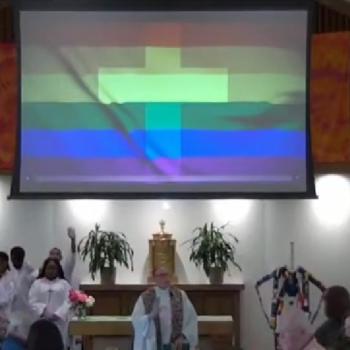What constitutes the common good? Recently, a fellow Patheos blogger wrote about Christians and the common good. For the full article, please click here. In the article, the author stated the following:
Christians are called to move out beyond their own private interests and concerns, to truly work for and promote the common good, both in their spiritual live, but also in their civic engagements. And, in doing so, they will find they are also protecting and promoting their own good, for the common good includes them.
In reading the article, what constituted the “common good” is caring for the environment, compassion, love, and consideration for the good of others. All well and good, but a clear list of common goods would go a long way towards proving readers with action items needed to promote the common good. Mostly, the reader is left with what the common good is not. The common good is not mass shootings, hatred engendered by Donald Trump, anti-immigration policy, and anti-environmentalism. Now, does this mean that the common good is gun control, voting against Donald Trump, pro-immigration policy, and pro-environmental policy? This seems to be the intent of the author. The author even makes a point that supporting such common good policies may mean giving up certain rights, privileges, and comforts. Is the author correct? Does the author show a clear understanding of a Catholic view of the common good?
The Catholic Definition of Common Good
According to the Catechism of the Catholic Church, the common good must meet certain criteria, or three essential elements:
- The common good must respect the human person.
“In the name of the common good, public authorities are bound to respect the fundamental and inalienable rights of the human person.” 1907
- It requires the social well-being and development of the group.
“in the name of the common good, between various particular interests; but it should make accessible to each what is needed to lead a truly human life: food, clothing, health, work, education and culture, suitable information, the right to establish a family, and so on.” 1908
- It promotes peace.
“authority should ensure by morally acceptable means the security of society and its members. It is the basis of the right to legitimate personal and collective defense.” 1909
Furthermore, the catechism sums up the common good in section 1912. It states:
The common good is always oriented towards the progress of persons: “The order of things must be subordinate to the order of persons, and not the other way around.” This order is founded on truth, built up in justice, and animated by love.
Therefore, the common good, as understood by the Catholic Church, must respect the rights of all human persons, the social well-being of all human persons, and ensure the peace and safety of all human persons. At the center of the common good is the human person. The order of the common good is impossible without truth, justice, and love.
“The Children” and the Common Good
Moreover, in a November 2022 article titled When Voting, Think Of The Children, the author again appeals to the common good when encouraging readers to “think of the children.” He states:
Those of us living in democracies need to promote, support, and vote for those who will work for the common good. If we see one politician wanting to help poor children, or migrant children, receive the justice which is their due, and another actively working to hinder if not eliminate such justice, we must vote for those who would implement positive change, and stand against those who would cause further harm. Those who ignore the environment, and what we are leaving behind for the children of today, let alone for the future, also find themselves far from engaging the justice children need. [emphasis added]
And
We are not to ignore children and their needs, because they, in their vulnerability, have a unique relationship with God. [emphasis added]
In other words, the author appeals to “the children” in an emotional plea to vote Democratic in 2022.
Now, as a Catholic, I wholeheartedly agree we must help poor and migrant children. We also must engage as faithful stewards of the environment. To ignore the most vulnerable, the most helpless, constitutes the gravest of sins. Sadly, missing from the author’s appeal to “think of the children” are the most helpless and vulnerable children on earth—those children in the womb. These helpless and vulnerable 99% of Democratic politicians support killing, many into later development. Abortion stands in contradiction to the common good.
Abortion and the Common Good
How does abortion contradict the common good?
Simply put, abortion violates (and violently violates) all three essential elements of the common good.
- Abortion violates the rights of the unborn human person, especially the fundamental right to life itself.
- It violates well-being and development of the group by killing helpless and vulnerable members of the group. Each aborted person cannot pursue and enjoy food, clothing, culture, education, or starting a family. Instead, they become biological waste.
- Abortion entails the opposite of peace. Again, abortion represents a violent assault of the helpless and vulnerable unborn. For the aborted, the womb becomes a tomb.
- Finally, abortion puts an end to a person’s progress. Moreover, those who support it deny the truth of the personhood of the unborn. There exists no justice and love for the aborted.
Furthermore, it smacks as hypocrisy to state in one breath “think of the children,” and in another to vote for Democrats who support the killing of unborn children in abortion. Now, some may claim this issue is more complicated, but they cannot claim abortion is inline with the common good, or at least the Catholic understanding of it. What about the common good and the family?
The Family and the Common Good
On December 13th, 2022, Joe Biden (a Democrat) signed into law a Democrat lead Respect for Marriage Act (H.R. 8404) and thereby codified into federal law same-sex marriage. According to a statement by the United States Conference of Catholic Bishops, this bill represents a viable threat to religious liberty. Not only this, but the bill also stands in direct opposition to the Catholic understanding of the common good.
Pope Francis wrote in 2016 that “we can hardly stop advocating marriage simply to avoid countering contemporary sensibilities…. We would be depriving the world of values that we can and must offer.” Indeed marriage, which is a lifelong and exclusive union, a complete and mutual gift of the husband and wife to each other for their good and for the procreation and education of children, is essential to the common good.
Once again, Democratic politicians spearheaded legislation contrary to the common good, in this case the common good as it relates to the family. Democratic politicians appear unconcerned with the concept of the common good regarding the family. Therefore, I too bear no compulsion to vote for them.
The Selective Common Good…
Clearly, the author of the above articles represents someone who believes in selective common good. He supports politicians who endorse social programs that provide social safety nets, which appears noble on the surface. However, when one looks closely at the fundamental understanding of what constitutes the common good, Democrats fall utterly short. Their views on abortion and marriage, not to mention transgender youth, stand in direct conflict with the common good, as understood by the Catholic Church. How can I as a Catholic vote “thinking of the children” without thinking of the unborn children? How can I as a Catholic voter vote to support programs for needy families when “the family” and my religious liberty are under attack?
If Democrats abandon their support of killing the most vulnerable children in the womb and support the family, they have my vote. Until then, no thanks. How other Catholics justify an appeal to the common good as also an appeal to vote for politicians who stand against the Catholic understanding of the common good, remains beyond my comprehension. To me, the author’s understanding of the common good seems very selective. I hope this article provided the necessary context when one considers the common good and which politicians deserve our support.
Faustian Bargain
Democrats use Catholic compassion for the needy to make Faustian bargains that requires Catholic to stand against their own Church on fundamental issues. Please, do not make that bargain. The choice is yours.
If you enjoy my writing and want to support my work, please consider donating a monetary gift of any size or quantity by clicking here. Thank you!
Read my other writing here.
Please click the link below to join.
Voices of the Faithful in the Synod on Synodality
Please make your voice heard.
I Support Church Teaching in the Synod of Synodality












